PARTNER
Densho
Visit partner
COLLECTION ID
ddr-densho-36
DESCRIPTION
The collection of the Museum of History & Industry of Seattle, Washington, circa 1914-1940s, focuses on the mass removal of Japanese Americans from Bainbridge Island and Seattle, Washington. Staff photographers for the Seattle Post-Intelligencer, a local newspaper, took all the photographs. There are also several images of prewar Nihonmachi and postwar memorial services for Nisei soldiers.
INCLUSIVE UNIT DATE
c.1914-1949
BULK UNIT DATE
1942
PHYSICAL DESCRIPTION
63 photographic prints, black and white
CONTRIBUTOR
Museum of History & Industry
CREATORS
PREFERRED CITATION
Courtesy of the Seattle Post-Intelligencer Collection, Museum of History & Industry, Seattle
RIGHTS
Copyright restricted
63 Objects
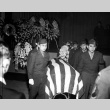
img
Funeral service for a Nisei soldier (ddr-densho-36-1)
This service for a Nisei soldier was held at the Seattle Buddhist Church.
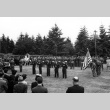
img
Funeral service for a Nisei soldier (ddr-densho-36-2)
Funeral service for a Nisei soldier at the Washelli Cemetery.
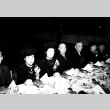
img
Nisei Memorial Dinner (ddr-densho-36-3)
Mr. and Mrs. Shinichi Seike (placement unknown) attend the Nisei Memorial Dinner.
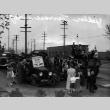
img
Scrap metal donation (ddr-densho-36-4)
These people are donating scrap metal at Yesler Terrace, which was next to the pre-World War II Nihonmachi (Japantown) area of Seattle, Washington.
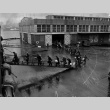
img
Japanese Americans board ship bound for Hawaii (ddr-densho-36-5)
These Japanese Americans are returning to Hawaii from Seattle, Washington, pier 42.
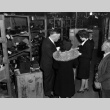
img
Couple reclaiming property (ddr-densho-36-6)
Japanese Americans waiting to reclaim their property after World War II.
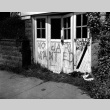
img
Racial epithet (ddr-densho-36-7)
This racial epithet was painted on the garage door of a Japanese American. The photo may have been taken during the resettlement period.
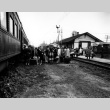
img
En route to Manzanar Assembly Center (ddr-densho-36-8)
Japanese Americans from Bainbridge Island, Washington are being transported to the Manzanar Assembly Center, California. Manzanar Assembly Center became a WRA incarceration camp on June 1, 1942.
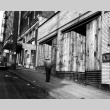
img
Nihonmachi (Japantown) after mass removal (ddr-densho-36-9)
The stores on this block of Sixth Avenue South were closed and boarded up when their Japanese American operators were removed.
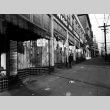
img
Nihonmachi (Japantown) after mass removal (ddr-densho-36-10)
The Higo Ten-Cent Store, located on Jackson Street. The Murakamis were able to reopen their store after the war because they were able to pay property taxes while interned. Higo Variety Store was run by Aya and Masako Murakami after the war.

